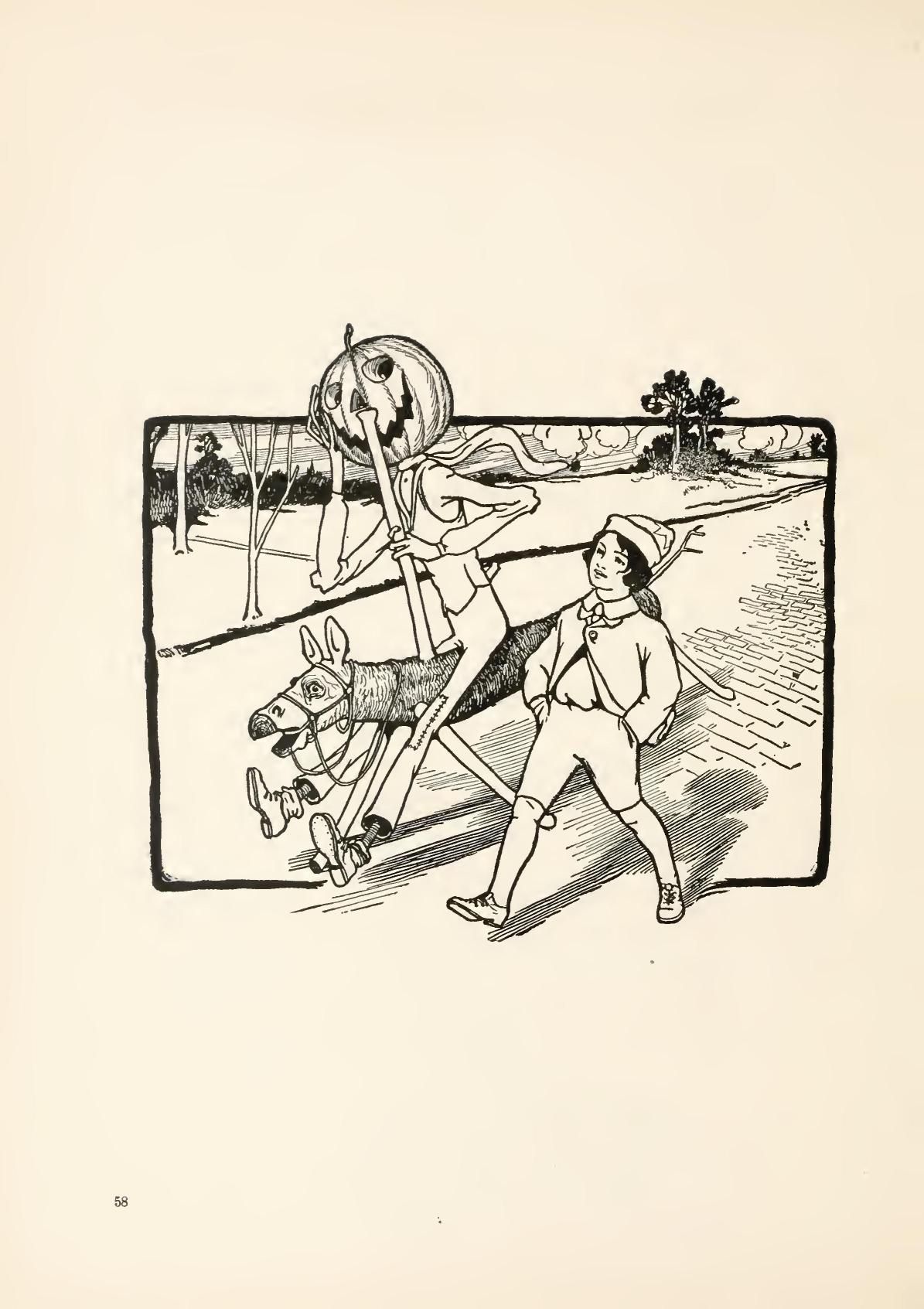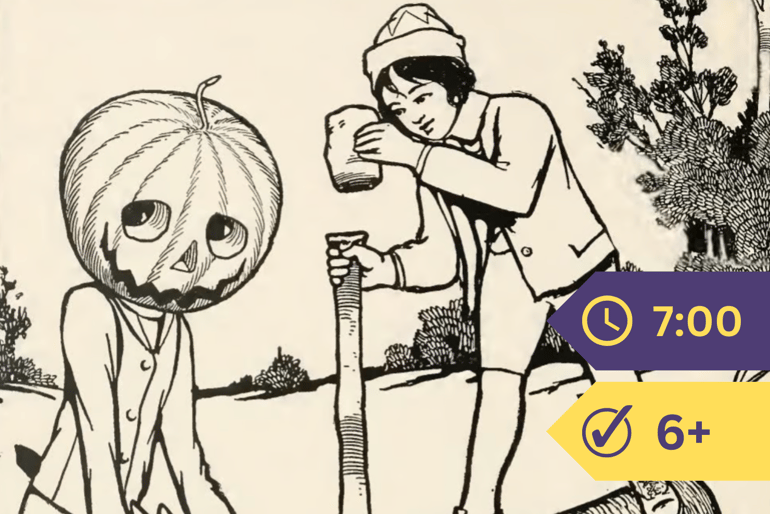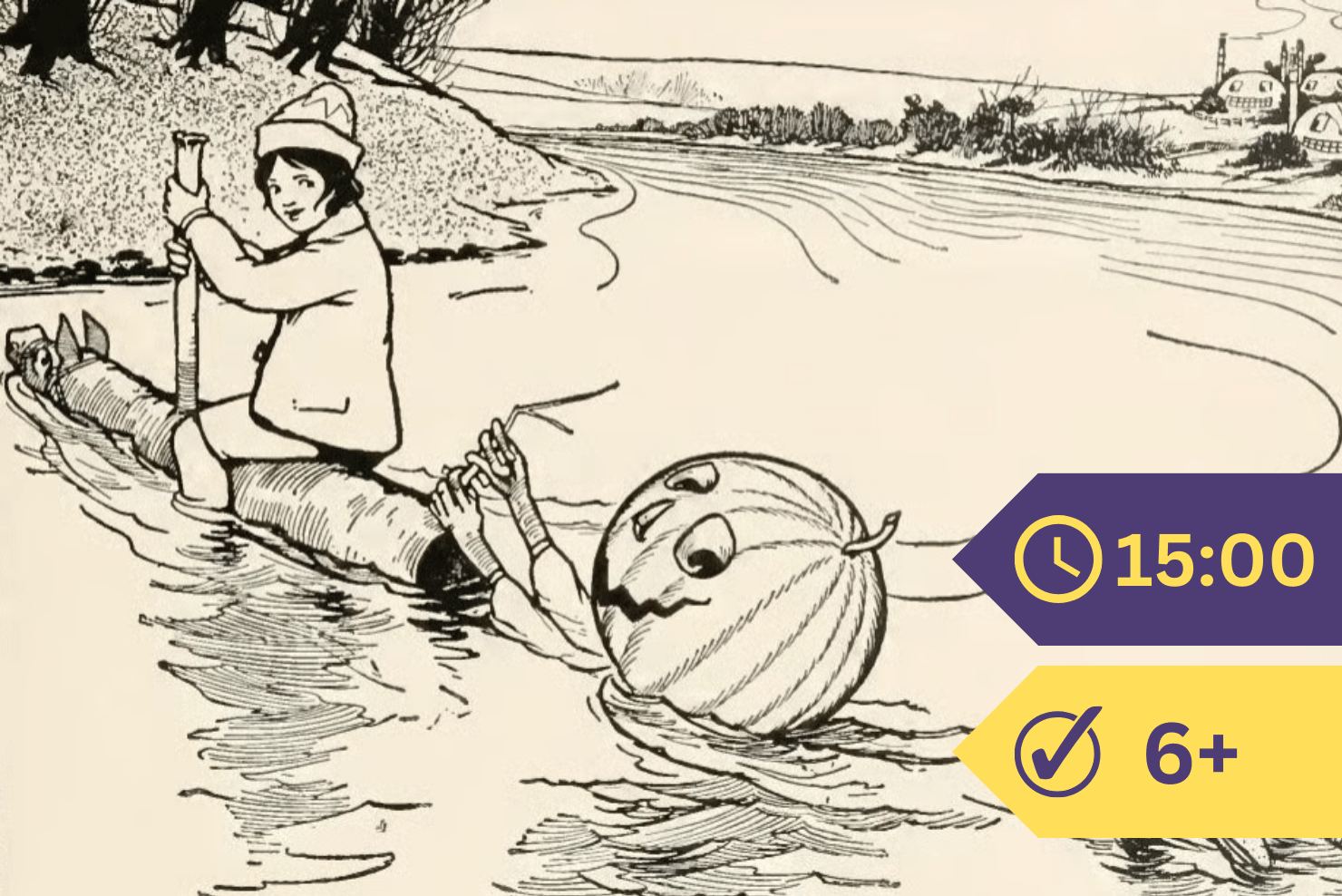The Saw-Horse, finding himself alive, seemed even more astonished than Tip. He rolled his knotty eyes from side to side, taking a first wondering view of the world in which he had now so important an existence. Then he tried to look at himself; but he had, indeed, no neck to turn; so that in the endeavor to see his body he kept circling around and around, without catching even a glimpse of it. His legs were stiff and awkward, for there were no knee-joints in them; so that presently he bumped against Jack Pumpkinhead and sent that personage tumbling upon the moss that lined the roadside.
Tip became alarmed at this accident, as well as at the persistence of the Saw-Horse in prancing around in a circle; so he called out:
“Whoa! Whoa, there!”
The Saw-Horse paid no attention whatever to this command, and the next instant brought one of his wooden legs down upon Tip’s foot so forcibly that the boy danced away in pain to a safer distance, from where he again yelled:
“Whoa! Whoa, I say!”
Jack had now managed to raise himself to a sitting position, and he looked at the Saw-Horse with much interest.
“I don’t believe the animal can hear you,” he remarked.
“I shout loud enough, don’t I?” answered Tip, angrily.
“Yes; but the horse has no ears,” said the smiling Pumpkinhead.
“Sure enough!” exclaimed Tip, noting the fact for the first time. “How, then, am I going to stop him?”
But at that instant the Saw-Horse stopped himself, having concluded it was impossible to see his own body. He saw Tip, however, and came close to the boy to observe him more fully.
It was really comical to see the creature walk; for it moved the legs on its right side together, and those on its left side together, as a pacing horse does; and that made its body rock sidewise, like a cradle.
Tip patted it upon the head, and said “Good boy! Good Boy!” in a coaxing tone; and the Saw-Horse pranced away to examine with its bulging eyes the form of Jack Pumpkinhead.
“I must find a halter for him,” said Tip; and having made a search in his pocket he produced a roll of strong cord. Unwinding this, he approached the Saw-Horse and tied the cord around its neck, afterward fastening the other end to a large tree. The Saw-Horse, not understanding the action, stepped backward and snapped the string easily; but it made no attempt to run away.
“He’s stronger than I thought,” said the boy, “and rather obstinate, too.”
“Why don’t you make him some ears?” asked Jack. “Then you can tell him what to do.”
“That’s a splendid idea!” said Tip. “How did you happen to think of it?”
“Why, I didn’t think of it,” answered the Pumpkinhead; “I didn’t need to, for it’s the simplest and easiest thing to do.”
So Tip got out his knife and fashioned some ears out of the bark of a small tree.
“I mustn’t make them too big,” he said, as he whittled, “or our horse would become a donkey.”
“How is that?” inquired Jack, from the roadside.
“Why, a horse has bigger ears than a man; and a donkey has bigger ears than a horse,” explained Tip.
“Then, if my ears were longer, would I be a horse?” asked Jack.
“My friend,” said Tip, gravely, “you’ll never be anything but a Pumpkinhead, no matter how big your ears are.”
“Oh,” returned Jack, nodding; “I think I understand.”
“If you do, you’re a wonder,” remarked the boy “but there’s no harm in thinking you understand. I guess these ears are ready now. Will you hold the horse while I stick them on?”
“Certainly, if you’ll help me up,” said Jack.
So Tip raised him to his feet, and the Pumpkinhead went to the horse and held its head while the boy bored two holes in it with his knife-blade and inserted the ears.
“They make him look very handsome,” said Jack, admiringly.
But those words, spoken close to the Saw-Horse, and being the first sounds he had ever heard, so startled the animal that he made a bound forward and tumbled Tip on one side and Jack on the other. Then he continued to rush forward as if frightened by the clatter of his own foot-steps.
“Whoa!” shouted Tip, picking himself up; “whoa! you idiot whoa!” The Saw-Horse would probably have paid no attention to this, but just then it stepped a leg into a gopher-hole and stumbled head-over-heels to the ground, where it lay upon its back, frantically waving its four legs in the air.
Tip ran up to it.
“You’re a nice sort of a horse, I must say!” he exclaimed. “Why didn’t you stop when I yelled ‘whoa?’”
“Does ‘whoa’ mean to stop?” asked the Saw-Horse, in a surprised voice, as it rolled its eyes upward to look at the boy.
“Of course it does,” answered Tip.
“And a hole in the ground means to stop, also, doesn’t it?” continued the horse.
“To be sure; unless you step over it,” said Tip.
“What a strange place this is,” the creature exclaimed, as if amazed. “What am I doing here, anyway?”
“Why, I’ve brought you to life,” answered the boy “but it won’t hurt you any, if you mind me and do as I tell you.”
“Then I will do as you tell me,” replied the Saw-Horse, humbly. “But what happened to me, a moment ago? I don’t seem to be just right, someway.”
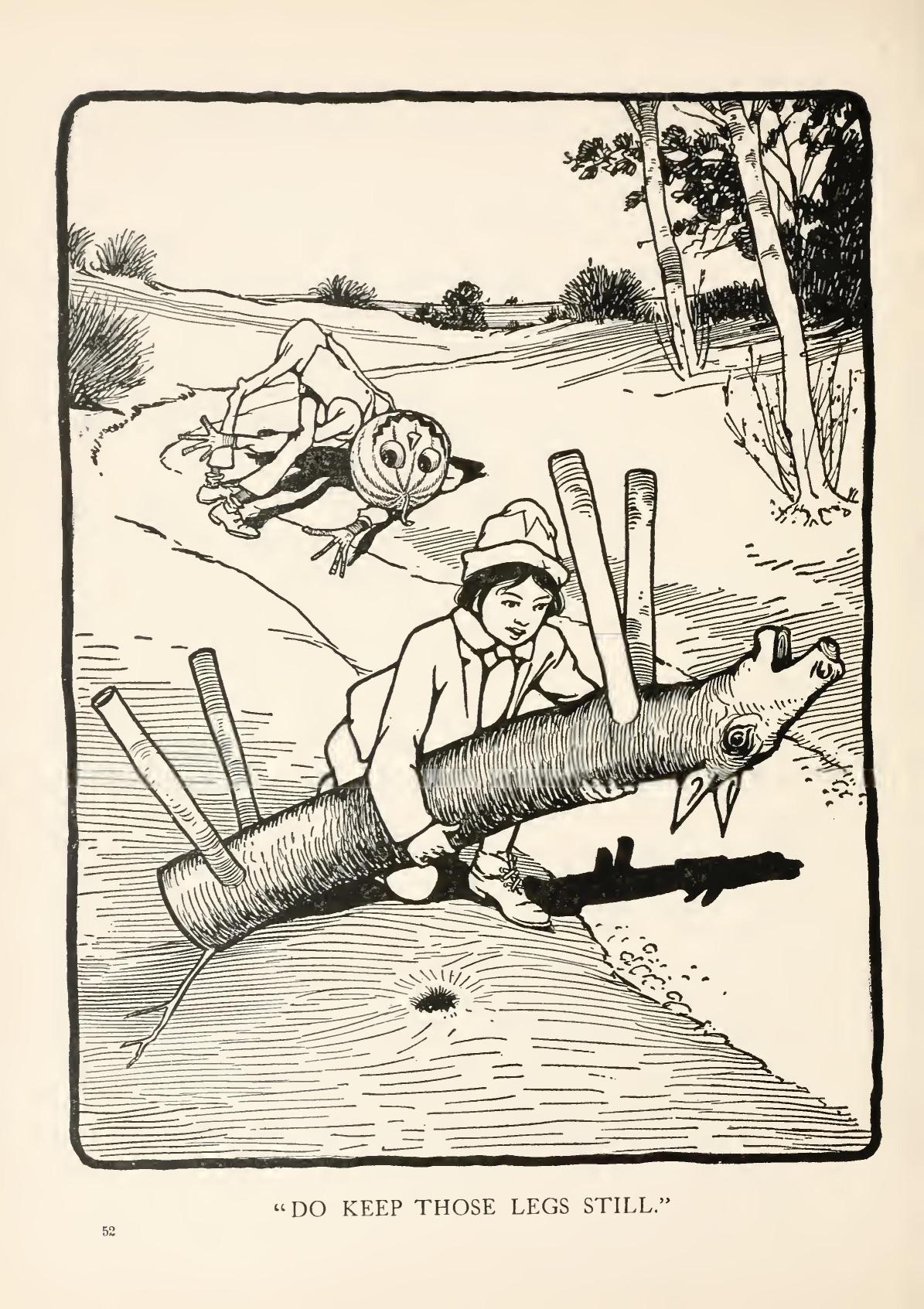
“You’re upside down,” explained Tip. “But just keep those legs still a minute and I’ll set you right side up again.”
“How many sides have I?” asked the creature, wonderingly.
“Several,” said Tip, briefly. “But do keep those legs still.”
The Saw-Horse now became quiet, and held its legs rigid; so that Tip, after several efforts, was able to roll him over and set him upright.
“Ah, I seem all right now,” said the queer animal, with a sigh.
“One of your ears is broken,” Tip announced, after a careful examination. “I’ll have to make a new one.”
Then he led the Saw-Horse back to where Jack was vainly struggling to regain his feet, and after assisting the Pumpkinhead to stand upright Tip whittled out a new ear and fastened it to the horse’s head.
“Now,” said he, addressing his steed, “pay attention to what I’m going to tell you. ‘Whoa!’ means to stop; ‘Get-Up!’ means to walk forward; ‘Trot!’ means to go as fast as you can. Understand?”
“I believe I do,” returned the horse.
“Very good. We are all going on a journey to the Emerald City, to see His Majesty, the Scarecrow; and Jack Pumpkinhead is going to ride on your back, so he won’t wear out his joints.”
“I don’t mind,” said the Saw-Horse. “Anything that suits you suits me.”
Then Tip assisted Jack to get upon the horse.
“Hold on tight,” he cautioned, “or you may fall off and crack your pumpkin head.”
“That would be horrible!” said Jack, with a shudder. “What shall I hold on to?”
“Why, hold on to his ears,” replied Tip, after a moment’s hesitation.
“Don’t do that!” remonstrated the Saw-Horse; “for then I can’t hear.”
That seemed reasonable, so Tip tried to think of something else.
“I’ll fix it!” said he, at length. He went into the wood and cut a short length of limb from a young, stout tree. One end of this he sharpened to a point, and then he dug a hole in the back of the Saw-Horse, just behind its head. Next he brought a piece of rock from the road and hammered the post firmly into the animal’s back.
“Stop! Stop!” shouted the horse; “you’re jarring me terribly.”
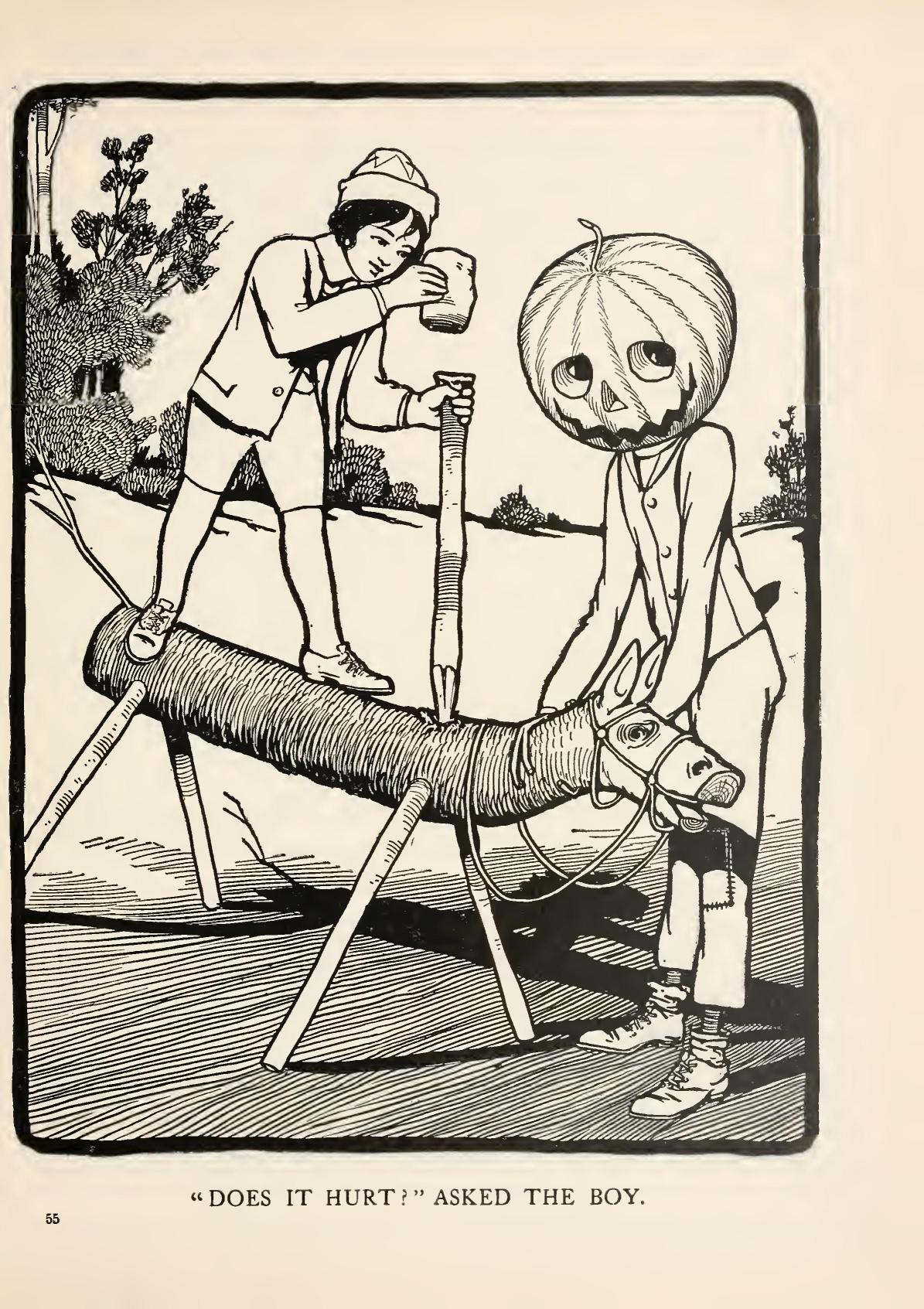
“Does it hurt?” asked the boy.
“Not exactly hurt,” answered the animal; “but it makes me quite nervous to be jarred.”
“Well, it’s all over now” said Tip, encouragingly. “Now, Jack, be sure to hold fast to this post and then you can’t fall off and get smashed.”
So Jack held on tight, and Tip said to the horse:
“Get up.”
The obedient creature at once walked forward, rocking from side to side as he raised his feet from the ground.
Tip walked beside the Saw-Horse, quite content with this addition to their party. Presently he began to whistle.
“What does that sound mean?” asked the horse.
“Don’t pay any attention to it,” said Tip. “I’m just whistling, and that only means I’m pretty well satisfied.”
“I’d whistle myself, if I could push my lips together,” remarked Jack. “I fear, dear father, that in some respects I am sadly lacking.”
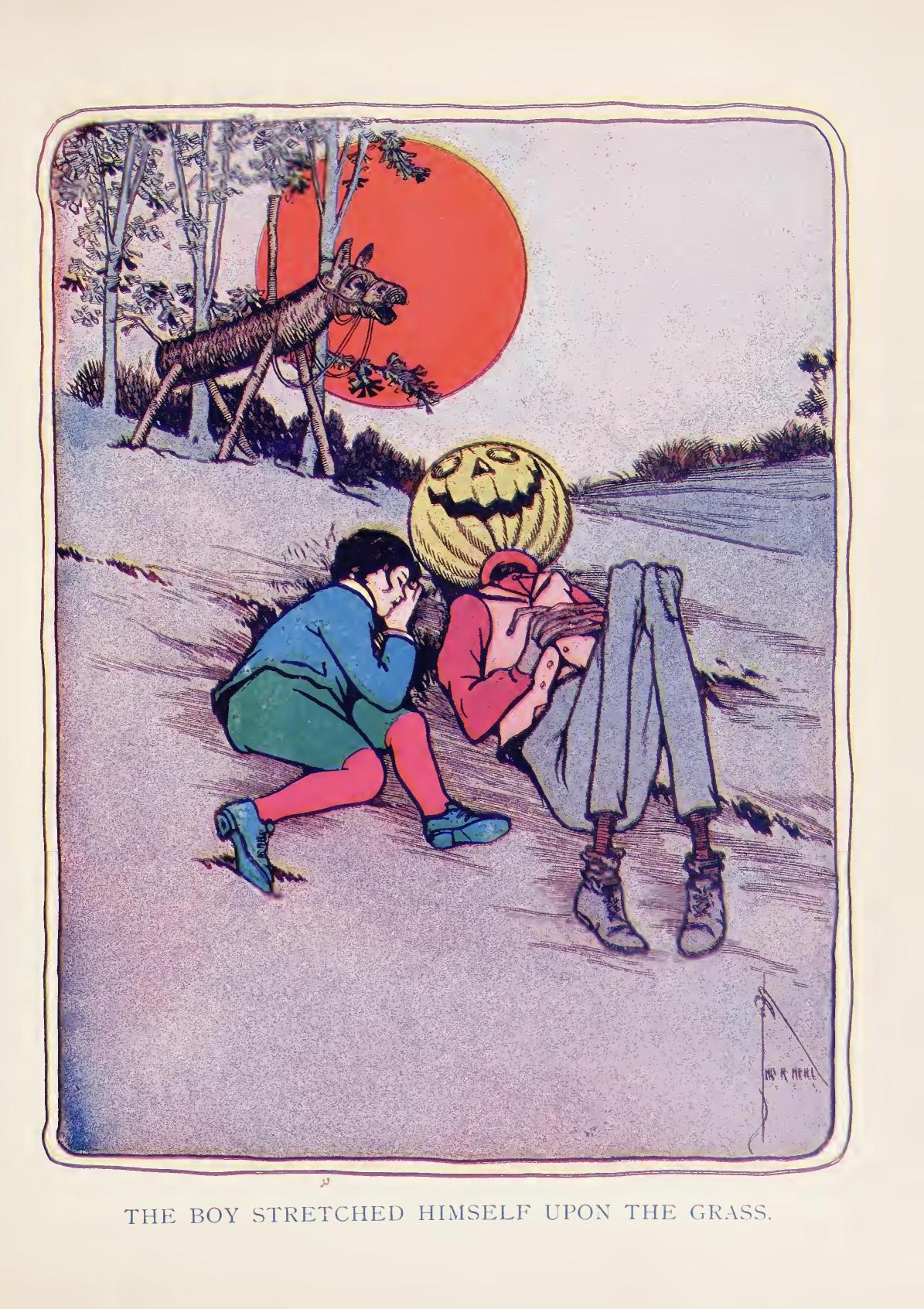
After journeying on for some distance the narrow path they were following turned into a broad roadway, paved with yellow brick. By the side of the road Tip noticed a sign-post that read:
“NINE MILES TO THE EMERALD CITY.”
But it was now growing dark, so he decided to camp for the night by the roadside and to resume the journey next morning by daybreak. He led the Saw-Horse to a grassy mound upon which grew several bushy trees, and carefully assisted the Pumpkinhead to alight.
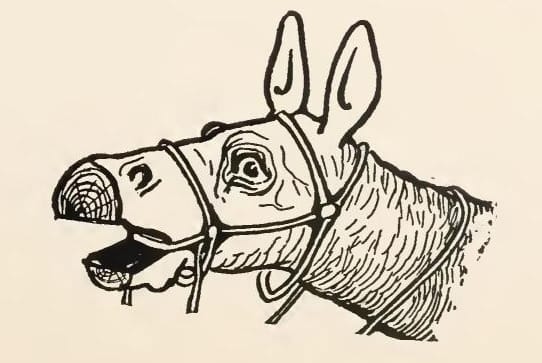
“I think I’ll lay you upon the ground, overnight,” said the boy. “You will be safer that way.”
“How about me?” asked the Saw-Horse.
“It won’t hurt you to stand,” replied Tip; “and, as you can’t sleep, you may as well watch out and see that no one comes near to disturb us.”
Then the boy stretched himself upon the grass beside the Pumpkinhead, and being greatly wearied by the journey was soon fast asleep.
